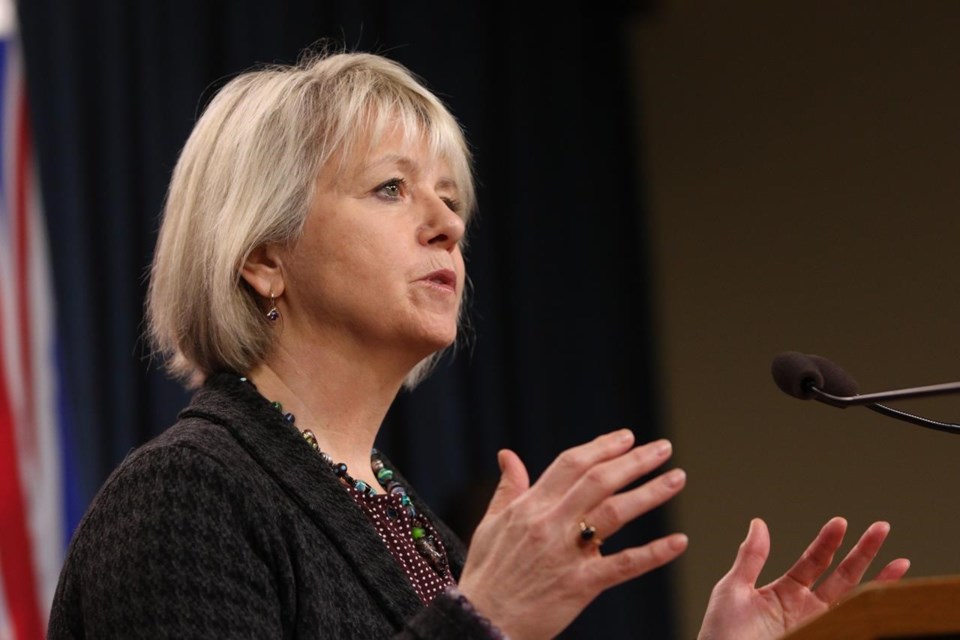VANCOUVER — Mask mandates are returning to health-care settings throughout British Columbia as cases of flu, COVID-19 and other respiratory illnesses trend upward.Â
Provincial health officer Dr. Bonnie Henry said Thursday the masks must be worn by all health-care workers, volunteers and visitors in patient-care areas starting Oct. 3 to guard against spreading illnesses to those who are vulnerable.
"Yes, it is a requirement and, yes, I do expect that people will comply with that," Henry said.
"It's important, as we have more infections in the community, that we do what we need to do to protect those people who are most at risk of having severe illness and frankly dying from influenza, from COVID, from (respiratory syncytial virus)."
The announcement came as the province set out plans for its flu and COVID-19 vaccination campaign, which is scheduled for launch on Oct. 10.
Henry said vaccines are expected to arrive soon and priority populations, such as seniors, Indigenous Peoples and those who are pregnant, will be asked to book appointments starting around that time.
The mask mandate applies to all hospitals and medical facilities owned and operated by health authorities, as well as long-term care homes, but does not extend to physicians, dentists or other private practitioners.
Henry also said that patients, clients and residents in long-term care will not be mandated unless they are directed by a health-care worker or by personal choice.Â
Critics, including the province's Green Party Leader Sonia Furstenau, say the move to reintroduce the mask mandate after rescinding it earlier this year "exemplifies a reactive, not proactive, approach to health care."
"Applying the same principle that masks in hospitals protect patients and workers, the government can exhibit strong leadership by mitigating risk in schools and public buildings with evidence-based measures, such as superior filtration and ventilation systems," Furstenau said in a statement Thursday.
Henry said she did not introduce a mask mandate for schools because they are different environments when compared with hospitals and health-care facilities, and other measures are in place.
"The most important thing we have in schools is that people stay home when they're sick, that we have provisions for that, that we've looked at ventilation, that we have a known population," Henry said. "It's not a bunch of different people coming and going."
Data collected by the province show COVID-19 hospitalizations have been rising since August, with September levels reaching the highest point seen since March — the end of last year's respiratory illness season.
Studies of British Columbians' COVID antibody levels show that as much as 80 per cent of the province's population has been infected by the virus at least once, creating hybrid immunity, when combined with vaccination, that is helping to prevent infections from developing serious symptoms.
But Henry said that protection should also be boosted with vaccination, as the newest COVID-19 and flu vaccines are tailored to the strains of viruses expected to circulate this season.
She said getting the vaccines in October is optimal for effective protection against illnesses this winter.
"What we're learning is that after each dose, that maximum protection against infection can last for two to three months," Henry said. "So, we want you to get the vaccine, and that's the timing.Â
"We want you to have that best protection during the period of time when the risk is greatest."
She said the mask mandate will be enforced, but she hopes it doesn't get to the point where security would be needed at facilities to make sure the rules are being followed.
"I appeal to our better natures," she said, adding masks are relatively unobtrusive.Â
"And I encourage everybody to take that point of view and to make sure that you're doing your part. It protects you and it protects those around you."
Health Minister Adrian Dix said the province has been reviewing hospital bed counts to assess the capacity to handle flu season and other patient demands, adding that he is setting СŔ¶ĘÓƵ's new bed base this fall at 9,880 beds, up from the historical 9,202 beds.
Another 1,500 "surge beds" are also being prepared by health authorities if extra capacity is needed, Dix said.
The province will hold its next update on the respiratory season on Oct. 5.
This report by The Canadian Press was first published Sept. 28, 2023.
Chuck Chiang, The Canadian Press




